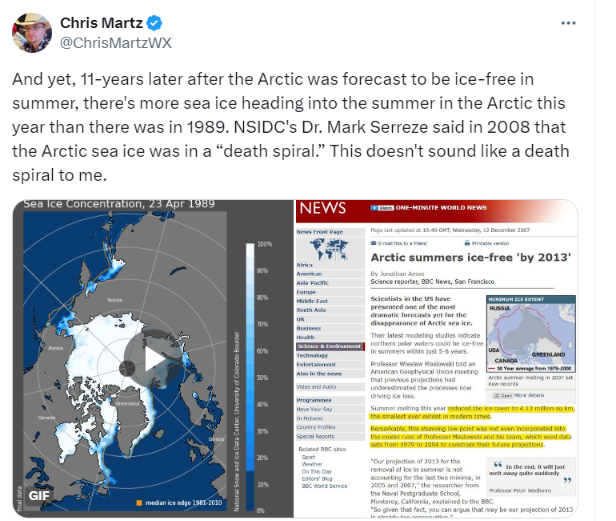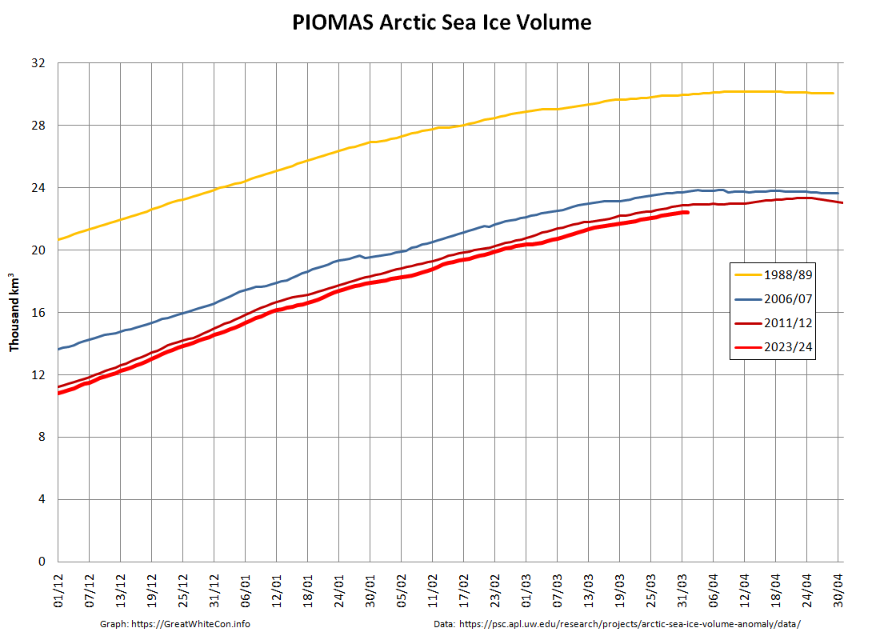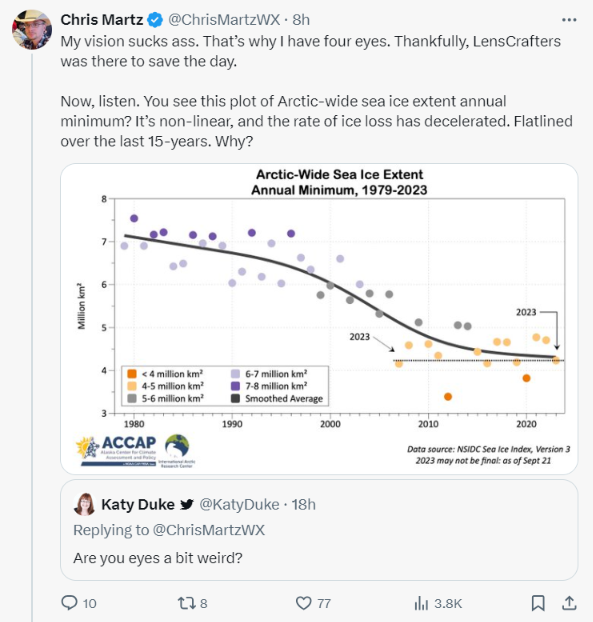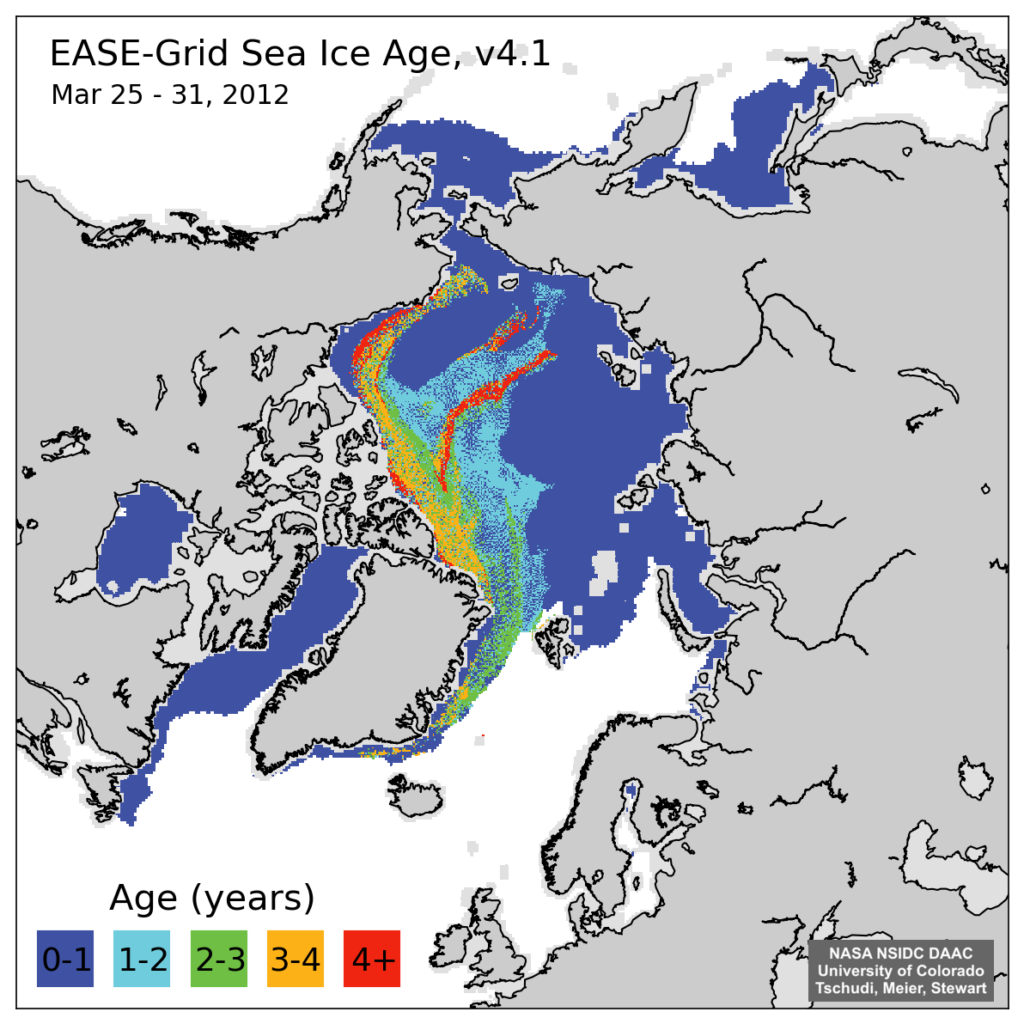Chris Martz, the new kid on the “skeptical block”, proudly proclaimed on XTwitter yesterday that:
There’s more sea ice heading into the summer in the Arctic this year than there was in 1989.
That is of course a porky pie:
As you can see, Chris also invokes the age old canard of the “Mark Serreze Arctic sea ice death spiral”. I discussed that very topic with Mark in 2015:
Mark told me that he still stood by his 2030 estimate for the onset of a seasonally ice free Arctic, although: “Most models say more like 2050”.
For some strange reason Chris doesn’t link to my in depth interview with Mark Serreze, but instead includes a screenshot of a 2007 article by BBC reporter Jonathan Amos with the following section highlighted in DayGlo yellow:
Summer melting this year reduced the ice cover to 4.13 million sq km, the smallest ever extent in modern times.
Remarkably, this stunning low point was not even incorporated into the model runs of Professor Maslowski and his team, which used data sets from 1979 to 2004 to constrain their future projections.
You can listen to a December 2007 interview with Prof. Maslowski about his research in our 2013 article: “Shock News! Why Isn’t the Arctic Ice Free?”
You will note that what Wieslaw actually said was: “If we project this trend ongoing for the last 10 – 15 years, we probably will reach zero in summer some time mid next decade.”
When accused of “cherry picking” Mr. Martz responded as follows:
“Snow White” felt compelled to enter the fray by answering the second of his questions as follows:
Katy showed you this 👇
— Snow White (@GreatWhiteCon) April 23, 2024
Here’s a quote from the source:
“The oldest ice (greater than four-years old) has been at very low levels since 2012 and is slightly lower than last year.”https://t.co/PiYjdLvQKH
QED? pic.twitter.com/qNrSpNUjGJ
Chris clearly doesn’t care for discussions about Arctic sea ice age, since this morning (UTC) he Xweeted as follows:
I presume that LensCrafters are an inferior American equivalent of Specsavers, since Chris has evidently still not seen “Snow’s” educational Xweet from yesterday. Hence “she” felt compelled to try and bring it to his attention once again:
I’ve (briefly!) explained that to you already Chris. 👇
— Snow White (@GreatWhiteCon) April 24, 2024
Did you blink and miss it?https://t.co/wyShCZnjfZ
Chris also appears to have been unable to read the article by Rick Thoman from which he extracted his “Arctic-wide sea ice extent annual minimum” graph, even after Katy attempted to bring it to his attention. Amongst other things it points out that:
The dramatic slow-down in trend in annual decrease in the past 15 years has been much discussed within the Arctic climate science community.
A new paper, led by Igor Polyakov at UAF and published in Science (open access summary here) takes an interdisciplinary approach and concludes that multi-year variations in the Arctic Dipole (an atmospheric circulation pattern: a somewhat dated wiki summary here) is a significant factor in modulating Arctic Sea ice, not only in moving ice around (long known), but if I understand correctly, even more importantly, in modulating the flow of Atlantic water into the Arctic, which is in turn effects sea ice melt from the bottom via changing water properties, e.g. temperatures and salinity at the ice/water interface. Polyakov et. al. suggest a change in the prevailing Arctic Dipole pattern is due and would bring a renewed acceleration of sea ice loss.
If you are not a citizen of the once United Kingdom, viewing this video may assist you in appreciating the joke:
Mr. Martz remains strangely silent over on XTwitter, but Bub has asked an intelligent question:

Here’s the answer:
Rob asks what I assume he feels is a rhetorical question:

Evenin' Rob (UTC),
— Snow White (@GreatWhiteCon) April 25, 2024
XTwitter neglected to notify me of your comment. Have you done something to offend Elmo?
In answer to your question, amongst other things as many years as it takes for the red area to increase above its level in 2008:https://t.co/wJOiw6cA21 pic.twitter.com/BtnXzWaX1Z
Watch this space!





I’m not watching that specsavers vid – I have my limits! Otherwise great post on the “extent”
The Specsavers ad is of course all done in the best possible taste!
To anybody with 20/20 vision it is clear that the young pretender has no clothes.
And that he is blind to the truth even when wearing LensCrafters’ finest offerings.